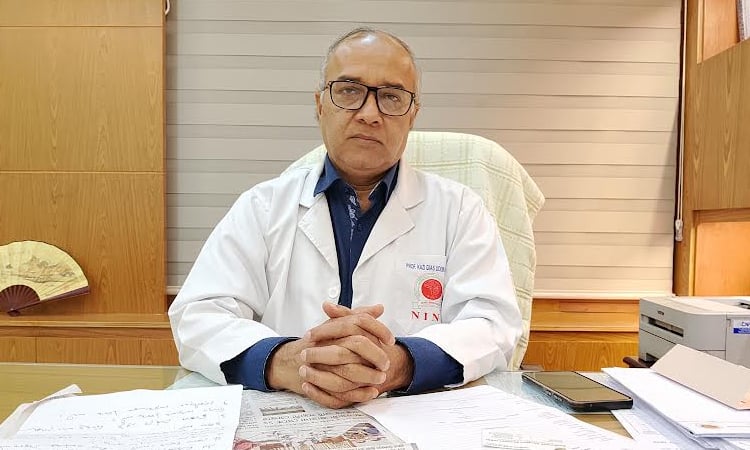News Flash
News Flash

By Borun Kumar Dash and Abdur Rouf
DHAKA, Nov 9, 2025 (BSS) - The National Institute of Neurosciences and Hospital (NINS) is set to introduce artificial intelligence (AI)-based medical services for stroke patients soon.
"We will soon launch AI-based treatment for stroke patients. In this method, we will connect a special device to the CT scan machine, linked to a central server. When a patient undergoes a CT scan, the device will automatically display the extent of brain stroke. The patient's data will go to the server, be processed by AI, and the system will then determine the appropriate course of treatment," Professor Dr Kazi Gias Uddin Ahmed, Director of NINS, told BSS in an interview.
He said about 95 percent of neurological investigation facilities are now available in Bangladesh.
"We will now conduct these investigations using AI-assisted software. For stroke patients, there is a quick procedure called mechanical thrombectomy (MT), which we have already introduced at our hospital. Through this, it is possible to remove blood clots easily. The advancement lies in identifying which specific part of the brain will yield the best results if the clot is removed from there. AI will also help measure the 'core volume'-the amount of clotted blood. For this, we are integrating the required programme into the CT scan machine," he said.
When asked why the number of neurological patients is increasing in Bangladesh, the NINS Director replied, "The main reason is stroke. The key risk factors are high blood pressure, diabetes, and cholesterol. Our diet often contains excessive fat, known as trans fat, which raises cholesterol levels-especially the bad kind, or low-density lipoprotein (LDL) cholesterol."
He added, "In urban life, most people no longer sleep or rest properly as they used to. Overuse of mobile phones and other devices has made people addicted. Many stay awake at night working. When sleep patterns are disrupted, it affects the hypothalamus in the brain, which controls all centers and hormonal systems. Damage to it can cause high blood pressure, diabetes, and other complications that increase the risk of stroke. With advanced investigations, we are now seeing stroke even among young people, often due to blood vessel problems."
When asked whether Bangladesh needs more specialized hospitals for neurological patients, Prof Gias said, "I believe such hospitals should be established in divisional cities like Chattogram, Rajshahi, and Khulna, and in major district towns. This would benefit many people. Also, if medical colleges across the country open specialized neurology units, the pressure on Dhaka will decrease."
On the need for neurology units at district hospitals, he said, "Yes, the time has come. If a district hospital can perform a CT scan and has either a neurologist or radiologist, stroke patients can receive proper treatment immediately. If advanced stroke care can be provided locally, patients won't always need to go to major medical centers."
Prof Gias continued, 'In other countries, stroke patients receive emergency care through ambulance-based systems. These ambulances are equipped with mobile CT scan machines-known as mobile stroke units. CT scans are performed inside the ambulance, reports are sent to doctors online. Based on that, patients receive immediate injections or treatment. As a result, patients get timely care, which prevents disability or paralysis. But if treatment is delayed, strokes can cause permanent damage."
He emphasized, "Our goal is to ensure stroke patients receive the required injection within the recommended time. But the main challenge in our country is that most patients don't recognize stroke symptoms promptly. By the time they do, three and a half to four hours have often passed-too late for effective treatment. Even those who do recognize symptoms face delays due to Dhaka's traffic and difficulty finding transportation. If patients could reach hospitals on time, proper treatment would be possible. But unlike abroad, we lack quick transport systems like mobile stroke units or special ambulances. To improve stroke care, we must enhance our transport, traffic management, and road systems simultaneously."
When asked whether there are enough doctors for neurological treatment, he said, "The current number of doctors is adequate to provide care. However, for neurosurgery, we need to increase the number of operation theaters, anesthesiology staff. Once we expand these resources, many of our obstacles will be resolved."
Regarding stroke prevention, the NINS Director said, "It's crucial to manage stress, exercise regularly, and eat a balanced diet. Controlling diseases like diabetes and high blood pressure, getting sufficient vitamins, and avoiding activities that strain the nerves are also important."
Stressing the importance of awareness, he added, "Many people in rural areas don't even know what a stroke is, when it occurs, or what its effects are. If awareness campaigns are conducted nationwide, we can significantly reduce disability rates. I believe that involving teachers and mosque imams in these campaigns would yield encouraging results."